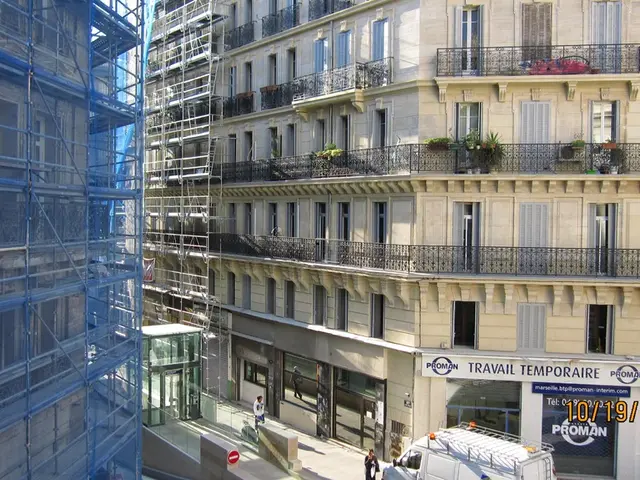Completed work on the underground area?
Montreal's Basement Living Crisis: Flood-Hit Areas Face Regulation Shift
The rising tide of heavy rainfall and resulting floods have sparked a significant debate over whether basements in Montreal are a thing of the past.
Isabelle Ducas, our go-to source, reveals that several boroughs have already imposed restrictions on building apartments or bedrooms in basements, particularly in low-lying areas or across their entire territory. Other jurisdictions are gearing up to implement similar regulations.
With flooding on the rise, is it wise to rebuild apartments in basements after a disaster? If not, where does that leave the less affluent tenants who often occupy these living spaces?
Maja Vodanovic, responsible for water infrastructure at the executive committee, acknowledges this dilemma: "That's the question people are asking."
The city is grappling with the implications of this phenomenon, with Maja and others working to determine how far buildings can be safeguarded against flooding.
In a low-lying region, Jean-Luc Martel, a professor at the École de technologie supérieure (ETS), warns against using basements as habitable spaces. Mathieu Gillet, an expert in sustainable urban development and responsible for business development at Écohabitation, echoes this sentiment: "When you decide to develop a basement, you're creating problems for yourself." Both these experts emphasize that the water issue must be the priority for city authorities.
The city has already prohibited garages with slope entrances for new constructions in multiple Montreal areas. For new construction projects over 1000 m2 with impermeable surfaces, developers must provide blueprints for rainwater retention systems, signed by an engineer. These designs must demonstrate the capability to retain 11 mm of rainwater during heavy downpours, regardless of the quantity of rain.
The regulations vary by borough, with each setting its specific restrictions. Here's a brief rundown of these restrictions in some locations:
- Ville-Marie: New developments are prohibited from having living spaces in the basement throughout the borough or in low-lying areas. The borough has also loosened other constraints to allow for additional floors to offset the loss of basement space.
- Mercier-Hochelaga-Maisonneuve: In low-lying areas, it is prohibited to develop independent apartments or bedrooms in the basement. Office, game room, or living rooms are permitted under certain conditions.
- Verdun: New independent dwellings in basements are not allowed, but bedrooms connected to ground-floor dwelling are permissible.
- Southwest: Independently-dwelling basements have been prohibited since 2016, except in a specific sector. Bedrooms connected to a ground-floor dwelling are allowed but must meet new standards.
- Côte-des-Neiges-Notre-Dame-de-Grâce: New dwellings in basements are not allowed, but basements can have bedrooms for single-family properties, duplexes, or triplexes.
- Saint-Laurent: Councilors are voting to approve basement dwellings only for plexes (4 units or fewer) with the installation of watertight doors and other protective measures.
- Plateau-Mont-Royal: The borough is considering a potential ban on constructing habitable spaces below sidewalk level.
Exploring the Subterranean Landscape
Water Management Solutions
According to Quebec's building code, new constructions with basements must have French drains (foundation drains) installed to handle water accumulation near the foundation. These mandatory systems are crucial for preventing water intrusion into basements by redirecting groundwater away from the home's foundation. The effectiveness of French drains depends on proper maintenance, with clogging or degradation over time leading to water infiltration issues.
Sump pumps, while not explicitly mandated by regulation, are a recommended practice for managing excess water and preventing basement flooding. These devices collect water in a sump pit and pump it outside, protecting basements from water damage and mold growth.
Support Programs and Future Trends
The city of Montreal and the Société d’Habitation du Québec offer grants or subsidies to homeowners for foundation repairs, which may include those necessary for defending against water damage. However, approval and funding disbursement may take several years, sometimes up to three years.
As urban development continues in flood-prone zones, there is a growing focus on enhancing basement waterproofing, flood resilience, and implementing stricter building codes, waterproofing, and flood-proof construction techniques to address climate change's impact.
An increased awareness of flood risks and their repercussions has given rise to legal disputes, such as the lawsuit filed by residents affected by recurring floods in Lachine condos. This legal scrutiny is expected to lead to stricter enforcement of building codes, potentially resulting in new legal requirements for flood-proofing residential basements.
Furthermore, grants and subsidies to assist homeowners in their efforts to mitigate basement flooding risks are anticipated to remain or expand.
- In the face of climate change and rising flood risks, the environmental science community cautions against using basements as habitable spaces, with the UNESCO Chair in Water Health at the École de technologie supérieure (ETS), Jean-Luc Martel, warning of potential problems.
- The city's finance department might consider offering incentives for real estate investors who prioritize sustainable urban development, such as building residential properties that are resilient to climate change and flooding, as Mathieu Gillet, an expert in sustainable urban development at Écohabitation, suggests.
- As water management solutions, French drains are mandated by Quebec's building code for new constructions with basements, while sump pumps, though not explicitly required, are recommended for managing excess water and preventing basement flooding.
- Given the lengthy approval and funding processes for foundation repairs through the city of Montreal and the Société d’Habitation du Québec, there is an increasing need for real-estgrading firms to consider investing in flood-proof construction techniques and technologies to ensure the long-term viability of their properties in flood-prone areas.








